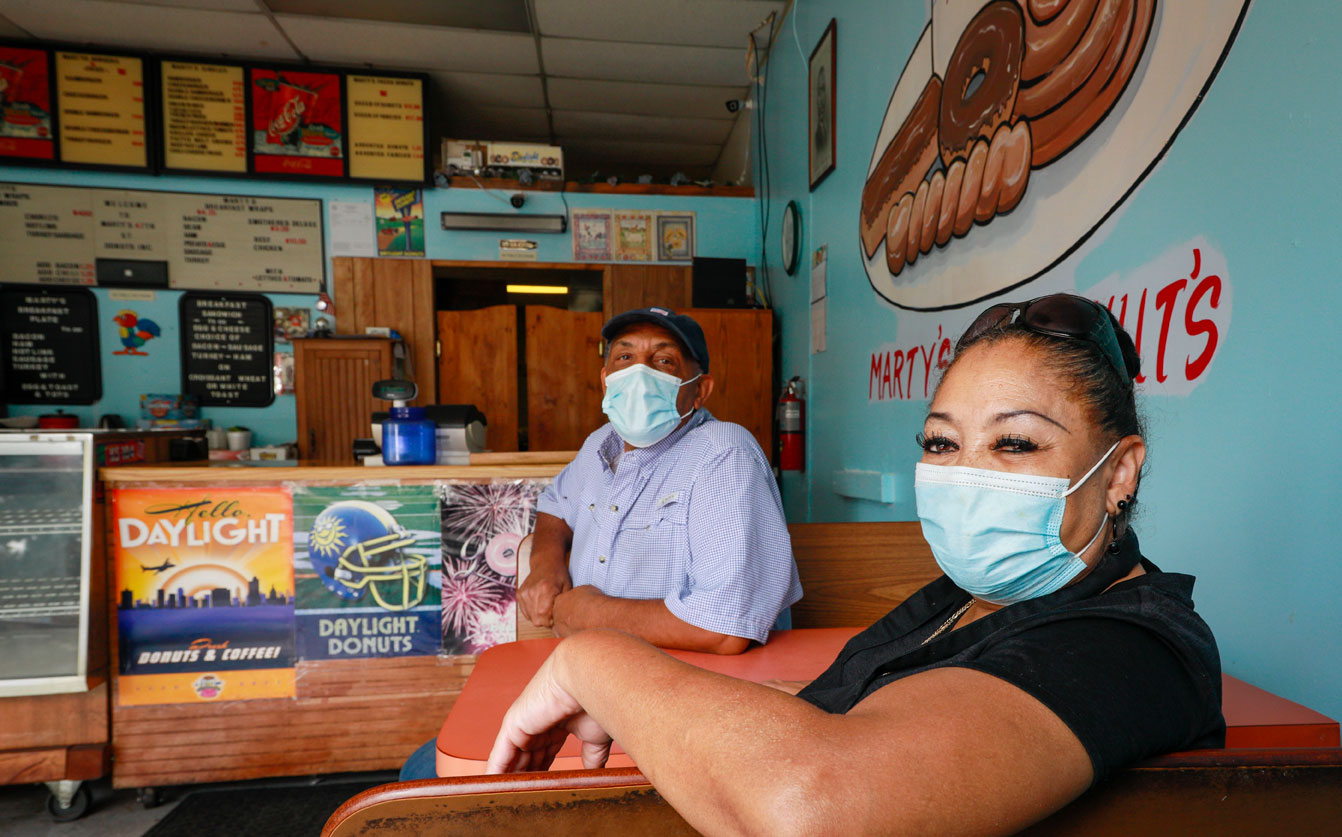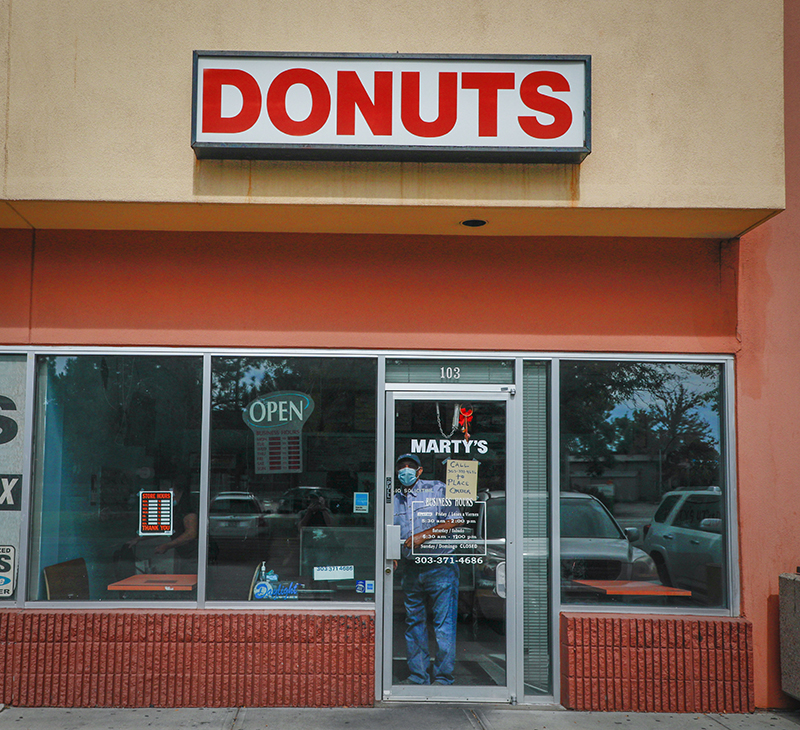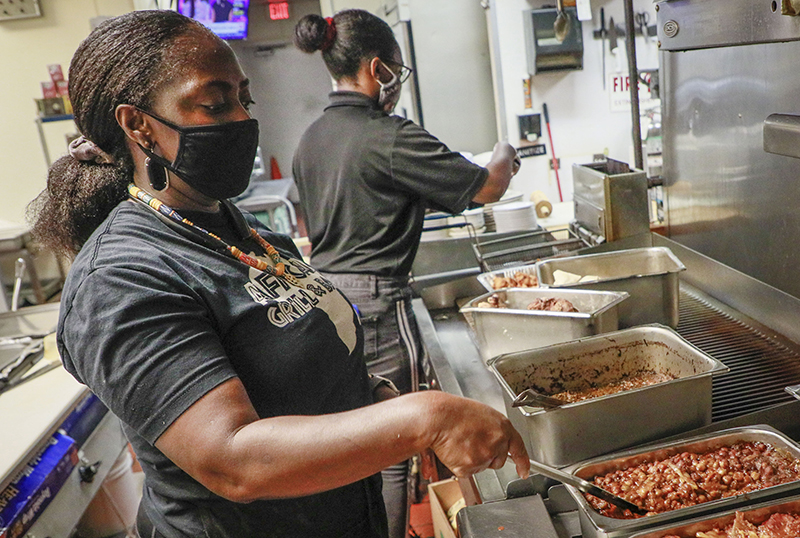
Marty and Jeannette Mayhew at their business, Marty’s 47th Street Donuts, in East Denver on Sept. 24, 2020. Photos by Joe Mahoney / Special to The Colorado Trust
Marty and Jeannette Mayhew at their business, Marty’s 47th Street Donuts, in East Denver on Sept. 24, 2020. Photos by Joe Mahoney / Special to The Colorado Trust
Nothing in the previous experience of Jeannette Mayhew and her husband Marty prepared them to open a donut shop. They just saw an opportunity, and jumped on it.
“We didn’t really know how to make donuts,” said Mayhew. “The [previous] owner said, ‘I’ll stay here and make donuts until you figure it out, we’ll pay you this much per hour.’ He did that for about a week, and he said ‘OK, I’m done.’ He left. No notice.”
They figured it out. In the 22 years since, Marty’s 47th Street Donuts became a mainstay of the Montbello neighborhood of Denver, popular with local businesses and students on the way to school.
Then the pandemic hit. The donut shop was considered an essential service, and stayed open for takeout. But without school in session or people going into work, 75% of their business vanished. Spring was a blur of forms and applications, as Mayhew tried to get federal or local help to stay afloat.
“I don’t know what’s going on or how this will work,” Mayhew told me in May, after several failed attempts to access a loan through the federal Paycheck Protection Program. “We’re real small, just a little shop. I’ve been watching the news—they’re giving it out to all these large companies.”

For safety reasons, Marty’s 47th Street Donuts is only serving takeout orders.
The Paycheck Protection Program, established by Congress as a way to help small businesses weather the devastation of the pandemic, has provided loans to more than 100,000 Colorado companies, according to an analysis by the Colorado Sun. When at least 60% of the loan is spent to pay employees and the rest on qualified expenses, it is forgivable.
When I spoke with Mayhew in May, she thought she’d know more “in three or four months.” But as the summer ended, nothing had become clearer.
Mayhew never received a loan through the Paycheck Protection Program, and her bank never gave her a reason. Instead, she applied for and received a separate small-business loan for $37,000, which she’ll have to pay back at 3% interest. That, along with a grant from community group Montbello Power Advocates (which receives funding from The Colorado Trust), has helped the business stay open, albeit with shorter hours.
“It really hasn’t improved that much. We’re still hanging in there,” said Mayhew in late August. “We are going to continue. As long as it don’t go any worse.”
Black-owned businesses, which have long faced barriers in accessing the same capital available to many white-owned businesses, came into the pandemic at a disadvantage. As the ongoing economic crisis pushes many small businesses over the precipice, Denver’s Black-owned businesses are struggling to hold on.
Nationwide, there is evidence that Black-owned businesses have been left out of federal aid efforts. Most lenders and businesses that participated in the Paycheck Protection Program opted not to disclose data on race or ethnicity, according to the Center for Public Integrity. Among those loans for which the information is available, less than 2% went to Black-owned businesses, Public Integrity found.
Discriminatory lending is likely to be a factor. Researchers affiliated with the National Community Reinvestment Coalition sent “mystery shoppers” to banks in the Washington, D.C. area in April and May. They found that white applicants—white men in particular—were significantly more likely to be encouraged to apply for Paycheck Protection Program loans than Black applicants with slightly better financial profiles. Black women were treated especially poorly.
Chuck Sagere is co-owner of the Montbello Barber Shop.
“It was the neighborhood country club,” before COVID-19, said Sagere. “People come in here to get their haircut, they come to have a little time to socialize, have a chance to talk and see friends.”
Like all barber shops, it closed during the height of the lockdown. When it reopened, it was with just three of the six barbers who usually worked there. Rent, though postponed during the lockdown, was still due. A grant from Montbello Power Advocates helped.
Sagere said he was discouraged by his bank from applying for a loan through the Paycheck Protection Program because of the employment status of the barbers; some were hired as contractors, rather than employees. He also didn’t want to take on debt that he wouldn’t be able to pay off.
Now, said Sagere, “We’re chugging along, still trying to get used to the new normal. We are getting used to the new regulations.”
Rent continues to be a worry. If things don’t pick up by the end of the year, Sagere estimated that they would be $12,000 in the hole on rent alone.
It’s been busy lately, though. Sagere was trying to hire new barbers.
“We’re back to being friends and family,” said Sagere. Most of his customers don’t do much more than go to work and come home. “This is the place they come to have a conversation with another adult besides their significant other. That’s kind of like the joy in this right now.”
For the owners of African Grill and Bar, a popular restaurant in Green Valley Ranch, the timing of the pandemic was devastating. Theodora and Sylvester Osei-Fordwuo, immigrants from Ghana, had opened a new branch in Lakewood, investing everything they had to buy a large space next to the Bowlero bowling alley. The business they had built up gradually over the year dropped off precipitously, by 80% or 90%.

Theodora Osei-Fordwuo and her daughter Maame, 15, prepare a catering order at the Lakewood location of African Bar and Grill on Sept. 22, 2020.
In late August, there were just a few customers dining in their spacious Lakewood restaurant, and no lines for their takeout specialties: red red (Ghanaian black-eyed pea and plantain stew), fufu (a starchy west African staple), red snapper, chicken drumsticks, samosas and chapati. The food was piping hot and delicious.
The couple did apply for and receive a small loan through the Paycheck Protection Program—they are hoping it will be forgiven—as well as a grant from Montbello Power Advocates. But as with the other businesses, they are staring at another season of uncertainty.
“That money helped, but at the same time, it didn’t help that much,” Theodora Osei-Fordwuo said recently. Their monthly expenses reach nearly $40,000 between the two businesses. “We don’t have a choice. We just have to hold on to it, and keep doing whatever we can.”